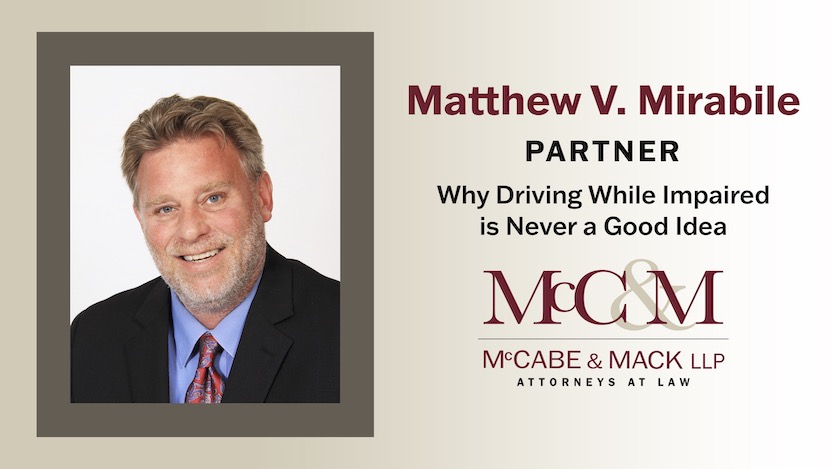Matthew V. Mirabile, Partner at McCabe and Mack LLP, recently reflected on how misguided many people are when it comes to driving under the influence of a substance.
“I often hear people mistakenly say that .16 is ‘twice the legal limit’, and that is simply not true. Yes, a blood alcohol level of .08 results in being charged with a crime, but if you have been drinking at ALL, you can get arrested for driving while impaired. There is NO legal limit.”
Although his areas of expertise are extensive (and include litigation/insurance defense, personal injury – plaintiff, subrogation, arbitration, and criminal defense), Matthew has worked on many cases over the years where he has seen first-hand the impacts of operating a motor vehicle while intoxicated. We asked him a few questions about this particular subject:
If I am pulled over and the officer asks if I’ve been drinking or if I’m under the influence of another substance, what should I say?
If you have been drinking or smoking and you are pulled over by law enforcement, and the officer asks if you have been drinking or smoking, there is a pretty good chance that the officer knows that you have been drinking already because he can smell the booze coming from your breath. Or the officer knows that you have been smoking because he was driving behind you and can smell weed emanating from your car. Telling a police officer that you have not been drinking or smoking most likely is not going to help you at all and in fact, you are going to lose all credibility with that police officer. A much better response, if you are asked a direct question about drinking or smoking, is that you have had some, but you are not impaired or intoxicated. Once a police officer asks you to conduct field sobriety tests, you can pretty much guarantee you are on the way to the police station, so keeping conversation to a minimum would be good advice. You can be respectful and cooperate with law enforcement without incriminating yourself too much.
Do I have a right to decline a breathalyzer? What happens if I do?
Every citizen has the right to decline a breathalyzer, field sobriety tests or an Alco-Sensor. However, your refusal to conduct field sobriety tests or an Alco-Sensor will be noted by law enforcement, and you can be charged with declining a chemical test. If you refuse a breathalyzer at the police station, you will most likely not only be changed with driving while intoxicated, but your license will also be revoked by the Department of Motor Vehicles for refusing a chemical test. Most people are better off taking a breathalyzer. If a DWI charge would result in a felony or you are very highly intoxicated, it would be a good idea to refuse a test.
If I am charged with a DWI, what can I expect to happen, and how can an attorney help?
You should retain legal counsel to help you, as these situations are always complicated. A DWI is a crime. If it is a first offense, it will be considered a misdemeanor; however, if it is the second time in 10 years, it can be deemed a felony. Either way, be sure to hire an attorney who is experienced with handling DWI cases, who is knowledgeable with the local Court, and who has a relationship with the County District Attorney’s office.
If you blow a .08 or greater, the Court will suspend your license pending prosecution. Your attorney can then petition the court for a hardship privilege so that you can get back and forth to work. A hardship license is discretionary with the Judge, so an attorney can be very useful in making it happen. Competent defense counsel will then speak with the District Attorney’s office about your case and speak with you regarding the challenges that exist with your case. Legal counsel is highly recommended to get a reduction of the charges of the best disposition possible.
If I have a party at my home and a minor – or adult – leaves intoxicated and gets a DWI on the way home, can I be held liable?
Purchasing or providing alcohol to a minor is a crime. Purchasing or providing alcohol to a person under the age of 21 is illegal. If a guest left your house in an intoxicated condition and was arrested for DWI, that certainly would be unfortunate, but it is doubtful there would be any criminal responsibility unless the guest was a minor. However, if a guest were to become intoxicated at your home, caused an accident, and causes someone to be hurt, there could potential be civil liability just like there is for a bar or a restaurant that allows an intoxicated person to buy a drink. If you are having a party where alcohol is going to be served, it is important that you have a plan as to how people will get home or stay if they can’t..
Anything else you would like to share?
It is NEVER a good idea to say “I am just going to have one or two drinks” or to consume marijuana if you are going to operate anything with a motor. Take a cab or Uber, designate someone to drive, or walk home. It does not take much to become impaired, and it is just not worth it. Remember – there is no legal limit. I have seen people arrested with a BAC of .04. The truth is, we have no way of knowing how our bodies are metabolizing alcohol or any other substance, so it is dangerous to drive if you have any kind of alcohol or drugs in your system.
Be safe out there, and if you have questions, reach out to McCabe and Mack LLP Partner Matthew V. Mirabile by calling 845.486.6868 or emailing: mmirabile@mccm.com.


